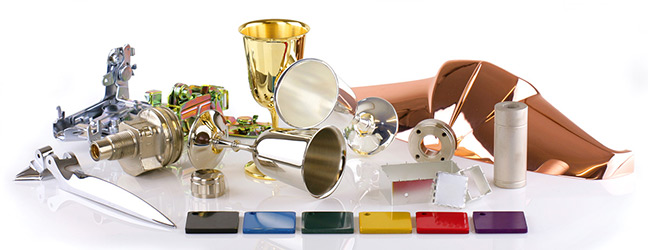Electroplating In Engineering And Manufacturing
Electroplating is one of the most useful metal finishing processes in the engineering and manufacturing industries. We provide electroplating services for companies in aerospace, automotive, healthcare, computer, and many other industries. As an electroplating company, we know the benefits that this metal finishing technique can have for a variety of applications. Read on to discover more about the advantages of electroplating and how it’s used in the engineering and manufacturing process.
What is electroplating?
To understand how electroplating works in engineering and manufacturing it is important to discuss how it affects and changes various materials. The process of metal electroplating involves coating one metal with a very thin layer of another type of metal. Achieving this effect starts by passing an electric current through a solution. The current partially dissolves the metals and therefore creates a chemical bond between the two materials. Metal electroplating will change the appearance of the base metal but will also provide several other benefits. A metal that’s electroplated will be more durable and less susceptible to rust. Depending on the metal, electroplating will yield different results.
Common electroplating examples
Electroplating is commonly used with a variety of different metals including tin, nickel, gold, silver, and copper. Metal electroplating will have slightly different characteristics depending on the combination of metals. Engineering and manufacturing use a wide range of combinations, but these are some of the most common:
Nickel electroplating
There are multiple advantages to zinc-nickel and nickel electroplating. Nickel electroplating is the most commonly used material for several reasons. Using nickel increases elemental resistance, conductivity, and strength. Metals like aluminium and steel are easily affected by rust, which will weaken their structural integrity over time. Nickel electroplating makes these materials far more suitable for manufacturing within the aerospace and automotive industries.
Copper electroplating
As a metal that has fantastic conductivity, copper electroplating is very useful in engineering and manufacturing. Copper electroplating is often used to coat a stronger base metal to improve electrical conductivity.
Gold electroplating
Gold has numerous elemental properties that make it very functional for metal finishing. Gold electroplating adds conductivity which makes it useful in the production of electronics. Other practical benefits of gold electroplating include increased corrosion and heat resistance.
Electroplating applications in engineering and manufacturing
Metal electroplating features in almost all engineering and manufacturing industries. Often electroplating works as a protective barrier for some metals to prevent corrosion. This process is especially useful for the manufacturing of vehicle and aeroplane parts, as the parts fitted are especially prone to elemental corrosion.
Electroplating also makes some metals more conductive and heat resistant. Increased conductivity makes copper electroplating and gold electroplating a widely used metal finishing technique in the production of electronic equipment.
Metal electroplating is also often used to improve the appearance of products. This process of applying a thin layer of quality metals is cost effective and creates a premium finish. This type of metal finishing process is frequently seen on jewellery and car interiors.
Dorsetware is a specialist electroplating company. Our team of experts provide a variety of electroplating services. To learn more about our services fill out our contact form or call us on 01202 677939.

